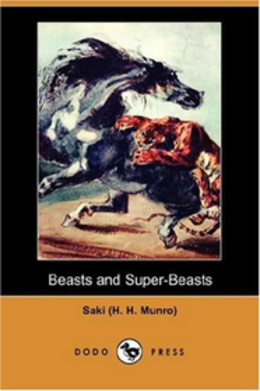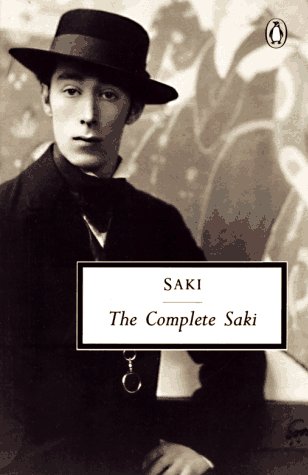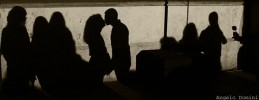
photo by Tim Caynes
In his essay, shortlisted for the
2013 THRESHOLDS International Feature Writing Competition,
Stephen Devereux recommends Saki’s ‘The Lumber Room’.
*
Comments from the judging panel:
‘By viewing Saki in his historical context, we are made aware of new subtleties in his writing’; ‘an intelligent and well-written discussion’; ‘a fresh and vivid look back at a well-known and once popular writer who is not much read these days’; ‘the animation and subversive pleasures of the story are brought to life in this very readable and enjoyable piece.’
*
by Stephen Devereux
Saki (the pseudonym of H. H. Munro) was one of the most successful short story writers of the early 20th century, though his career was cut short by a German sniper in 1916. At forty-three, he was exempt from conscription, but volunteered as an ordinary soldier, turning down a commission. The bitter irony of his last words – ‘Put out that bloody cigarette’ – makes a suitable epitaph.
The world that Munro wrote about was very much the Edwardian world that was to be so comprehensively wiped out by the First World War. I suspect that would have pleased him, had he survived. While the trappings of that era are instantly recognisable in his stories – the country house tea parties, tennis on the lawns, the British Empire, the public schools, the moral certainties – Munro’s take on the era was a distinctly sour one. Although his stories are often regarded as amusing and ingenious, making use of the unexpected reversal in the last paragraph, there are also, as Graham Greene has suggested, disturbing elements of cruelty and an admiration for the amoral realm of nature, particularly in the form of large predators.
Munro’s most successful stories reveal the adult world from the perspective of a child. His parents lived in Burma, servants of the British Empire, and when his mother died (killed by a cow!) his father sent him to England to be looked after by aunts. He was just two years old. The severe, unimaginative, repressive regime they imposed upon him was frequently the target of his stories, where small children outwit and humiliate stupid adults time and time again.
 In ‘The Lumber Room’ we are given the perspective of a young boy, Nicholas, on his aunt who, according to Munro’s sister, is a perfect portrait of one of the aunts who raised them. Nicholas knows, from the outset, that he is cleverer than his aunt. He also understands how her moral strictures are a mask for her love of cruelty.
In ‘The Lumber Room’ we are given the perspective of a young boy, Nicholas, on his aunt who, according to Munro’s sister, is a perfect portrait of one of the aunts who raised them. Nicholas knows, from the outset, that he is cleverer than his aunt. He also understands how her moral strictures are a mask for her love of cruelty.
The story begins with Nicholas being left out of a trip to the seaside because he is ‘in disgrace’. We soon learn that he is being punished for making a fool of his aunt: at breakfast he protested that there was a frog in his bread and milk. Naturally, the aunt dismissed his complaint as impossible, but Nicholas knew that he was right because he had put the frog there himself. To the boy, this confirmed that ‘older, wiser and better people had been proved to be profoundly in error in matters about which they had expressed the utmost assurance’.
Nicholas’ insight into adult motivations goes further, for he understands that the journey to the seaside has been hastily organised by his aunt, expressly so that he could be excluded. He believes that her cruelty is habitual, that she would ‘improvise something of a festival nature from which the offender would be rigorously debarred’. The choice of words is revealing – a ‘festival’ becomes something to be used to punish ‘offenders’ – as something joyous becomes an instrument of repression and punishment.
The aunt, who is to stay behind with Nicholas, warns him that he is not to go into the gooseberry garden. When he asks her why, he is told it is because he is in disgrace. The biblical allusions are unavoidable: he is locked out of Eden because of his sinfulness. Nicholas, we are told, ‘did not admit the flawlessness of the reasoning; he felt perfectly capable of being in disgrace and in the gooseberry garden at the same moment’. Munro’s use of zeugma – ‘in’ refers both to his spiritual condition and his physical position – is typical of his wit. While modern readers might see this as cleverness for its own sake, the energy of Nicholas’ demolition of his aunt’s logic gives it a satirical bite in the context of Edwardian hypocrisy.
The aunt becomes convinced that her dictat will make Nicholas all the more determined to hide in the gooseberry garden, so she pretends to be gardening to make sure that he doesn’t. Once again the absurd nature of her thinking is revealed. She has chosen to punish him by excluding him from the garden, then thinks that he will want to go there because she has excluded him, then has to spend her time pretending to do something she doesn’t want to do in order to thwart him.
While this works brilliantly as a story about a child outwitting a vindictive adult, it is also a marvellous satire on the prevailing morality of the period. The aunt’s logic is akin to the justification for the British Empire; she claims that she has a high moral purpose, that she acts in Nicholas’ interest, yet she simultaneously takes measures to protect herself from his inevitable revolt against her.
 The moves in the game become even more entertaining as Nicholas crawls through the grass towards the doors of the gooseberry garden. He does this several times, always making sure that his aunt sees him, and forcing her to keep a ‘self-imposed sentry-duty for the greater part of the afternoon’. This strategy provides Nicholas with an opportunity to activate a plan that had ‘long germinated in his brain’. He has been aware of a ‘fat, important looking key’ for some time, a key that can only be seen by climbing on a chair in the library. It is the key to the lumber room.
The moves in the game become even more entertaining as Nicholas crawls through the grass towards the doors of the gooseberry garden. He does this several times, always making sure that his aunt sees him, and forcing her to keep a ‘self-imposed sentry-duty for the greater part of the afternoon’. This strategy provides Nicholas with an opportunity to activate a plan that had ‘long germinated in his brain’. He has been aware of a ‘fat, important looking key’ for some time, a key that can only be seen by climbing on a chair in the library. It is the key to the lumber room.
When Nicholas enters this new space, the language of the story is transformed. The lumber room is described as a place of ‘mysteries’, an ‘unknown land’; the key is suddenly an instrument to prevent ‘unauthorised intrusions’. Part of the attraction of the lumber room is that it is reserved for adults, for ‘privileged persons’. Unlike the gooseberry garden, no one ever tells Nicholas not to enter it. No one ever mentions it, which makes it, for him, genuinely forbidden territory.
While the rest of the house is ‘dull and bare’, the lumber room is ‘full of wonderful things for the eye to feast on’. These include ‘twisted candlesticks in the shape of snakes’, a ‘teapot fashioned like a china duck’, a ‘carved sandal wood box packed tight with aromatic cotton-wool, and between layers of cotton-wool were little brass figures, hump-necked bulls, and peacocks and goblins, delightful to see and to handle’. There is also a dull-looking book that turns out to be full of coloured illustrations of ‘toucans, tiger-bitterns, brush turkeys, ibises, golden pheasants, a whole gallery of undreamed-of creatures’. These objects are probably the spoils of empire, but for Nicholas they are a feast for the senses and the imagination. He has found the secret heart of the house – a freedom, a gaudiness, a wildness that the adults themselves repress and keep under lock and key.
Among all these objects, it is a framed tapestry which fascinates Nicholas the most. He is attracted to its narrative aspect – a ‘living, breathing story’ which depicts a hunter from ‘some remote period’ who has ‘transfixed a stag with an arrow’. Nicholas thinks that it must have been an easy shot because the stag is very close to the hunter. Two dogs hold the stag at bay, but there are four ‘galloping wolves’ heading towards the hunter. Now Nicholas’ imagination takes over. There might be more wolves ‘hidden behind the trees’. Most intriguing of all to him is the question of whether the hunter sees the danger that Nicholas does. He notes that the hunter has only two arrows left, and although it would be easy to shoot the deer, it would be much harder to hit the running wolves. He decides that the hunter and his dogs are in a ‘tight corner’. The focus on wild animals, danger and violence is one found in many of Munro’s stories, despite their genteel setting. Perhaps, for the adult writer, they represented that which they symbolise for Nicholas himself in the story – power and freedom.
Nicholas hears his aunt’s voice from the gooseberry garden below the lumber room window. She has become concerned that she hasn’t seen him for some time and thinks he must have climbed over the wall to hide somewhere in the garden. She  calls out: ‘It’s no use trying to hide there. I can see you all the time.’ Her desperation and dishonesty add to Nicholas’ delight. We are told that this ‘was probably the first time for twenty years that anyone had smiled in that lumber room’. The shift of perspective is significant – this almost Zen-like moment is unlikely to be something that Nicholas would consider; it is Munro communicating directly with the reader, sharing his delight. Yet the story doesn’t stop there. More revenge is to come.
calls out: ‘It’s no use trying to hide there. I can see you all the time.’ Her desperation and dishonesty add to Nicholas’ delight. We are told that this ‘was probably the first time for twenty years that anyone had smiled in that lumber room’. The shift of perspective is significant – this almost Zen-like moment is unlikely to be something that Nicholas would consider; it is Munro communicating directly with the reader, sharing his delight. Yet the story doesn’t stop there. More revenge is to come.
The aunt shrieks and then calls out for help. Nicholas takes him time as he carefully replaces the objects he has moved, hides the colourful book under newspapers, locks the door and puts the key back on the shelf in the library. Only then does he go out into the garden.
The aunt calls out, telling him that, whilst looking for him, she fell into the rainwater tank. There is no water in it, but she can’t get out. She tells him to fetch a ladder and to bring it to her. But Nicholas reminds her that she told him not to enter the gooseberry garden. Of course, she now gives him permission, but he claims not to recognise her voice, to suspect that she is the Evil One his aunt has so often warned him about. To test whether she is his aunt or not, he asks her if there will be strawberry jam for tea. Hoping to bribe him with the jam, she says that there will be.
“Now I know that you are the Evil One and not aunt,” shouted Nicholas gleefully; “when I asked aunt for strawberry jam yesterday she said there wasn’t any.”
Nicholas has not only used her own belief system against her, he has also caught her out in one of the lies she habitually tells in order to punish him. He walks away, leaving her in the tank.
We are told that ‘Tea that evening was partaken of in a fearsome silence’. When the children return from their trip, it is revealed that the tide was at its highest so there was no beach to play on. Nicholas’ younger brother’s boots were too tight and put him in a terrible temper. The aunt, who has been rescued from the tank by a maid, can hardly mention what has happened to her without losing face. But Nicholas is not savouring his victory. He is thinking of the tapestry in the lumber room, believing that it was just possible that ‘the huntsman would escape with the hounds while the wolves feasted on the stricken stag’. Saki throws us back into the world of the imagination, the violence of nature, and the figure of the resourceful hunter.
Of course, the story is an absurd one. Nicholas’ revenge depends as much upon his aunt’s unwitting participation as it does upon his own ingenuity. He could not have predicted that she would fall in the rainwater tank, or that the tide would spoil the trip to the seaside. But the writing manipulates the reader into taking the side of the imaginative child against the restrictive adults, and, in entertaining us, Munro achieves a belated moral victory. The logic and the hypocrisy of Edwardian society and of the British Empire are overthrown.


Hi, I really enjoyed reading this story, How interesting Munro was.
Thank you
James driscoll
Agree well written.